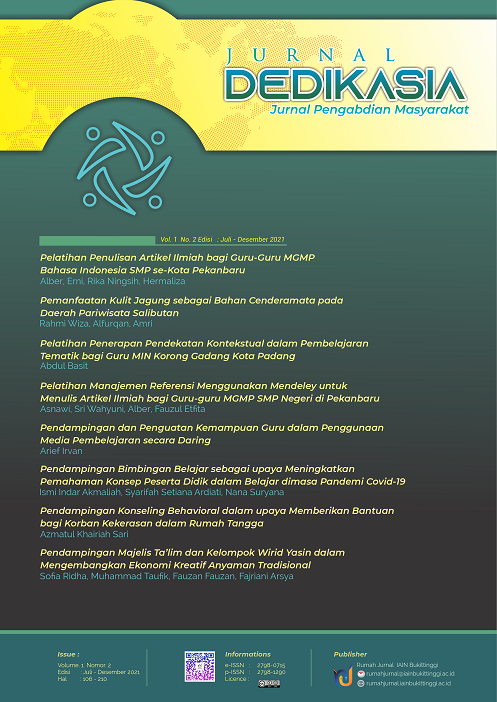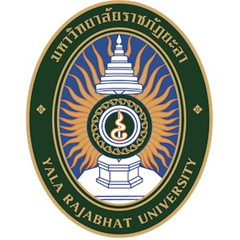Pendampingan Majelis Ta’lim dan Kelompok Wirid Yasin dalam Mengembangkan Ekonomi Kreatif Anyaman Tradisional
DOI:
https://doi.org/10.30983/dedikasia.v1i2.5297Keywords:
Pendampingan, Majelis Ta’lim, Ekonomi Kreatif, Anyaman, TradisionalAbstract
References
A Bandi .2009. Pembelajaran Seni Budaya dan Keterampilan, Jakarta: Direktorat Jenderal Pendidikan Islam Departemen Agama RI
Adi, Isbandi, Rukminto, (2008). Intervensi Komunitas: Pengembangan Masyarakat Sebagai Upaya Pemberdayaan Masyarakat. Jakarta: Rajawali Press
Bastomi, Suwaji .2003. Apresiasi Kesenian Tradisional, IKIP Semarang Press.
Burke, Peter .2000. Sejarah dan Teori Sosial. Bandung: Remaja Rosda Karya Offset.
Djelantik, A.A.M, 1999, Estetika Sebuah Pengantar. Bandung: MSPI.
Faisal, Abdullah. 2008. Metode dan Tekhnik KKN Transformatif. Surakarta: LP2M IAIN Press
Gustami, SP., 1990. “Konsep-konsep Produk Kriya Tadisional Indonesia, Analisis, Desain Melalui Pendekatan Sosial Budayaâ€, Makalah Seminar Kriya ISI Yogyakarta
Hanafi, Muhammad, dkk. Community Based Research. 2015. Surabaya: UINSA Press,
Hurairah, Abu. 2008. Pengorganisasian dan Pengembangan Masyarakat. Bandung: Humaniora.
Koentjaraningrat. 1989. Seni Tradisional Masyarakat, Jakarta: Sinar Harapan.
Salahuddin, Nadhir, dkk. 2015. Panduan KKN ABCD. Surabaya : UINSA Press
Downloads
Published
How to Cite
Issue
Section
Citation Check
License
Authors who publish with this journal agree to the following terms:
- Authors retain copyright and grant the journal right of first publication with the work simultaneously licensed under a Creative Commons Attribution License that allows others to share the work with an acknowledgment of the work's authorship and initial publication in this journal.
- Authors are able to enter into separate, additional contractual arrangements for the non-exclusive distribution of the journal's published version of the work (e.g., post it to an institutional repository or publish it in a book), with an acknowledgment of its initial publication in this journal.
- Authors are permitted and encouraged to post their work online (e.g., in institutional repositories or on their website) prior to and during the submission process, as it can lead to productive exchanges, as well as earlier and greater citation of published work (See The Effect of Open Access).




